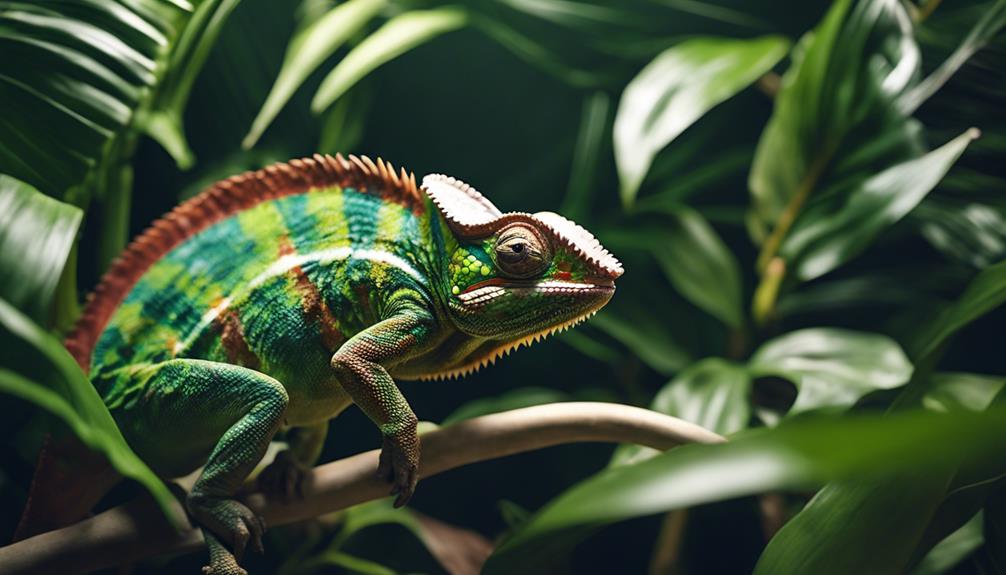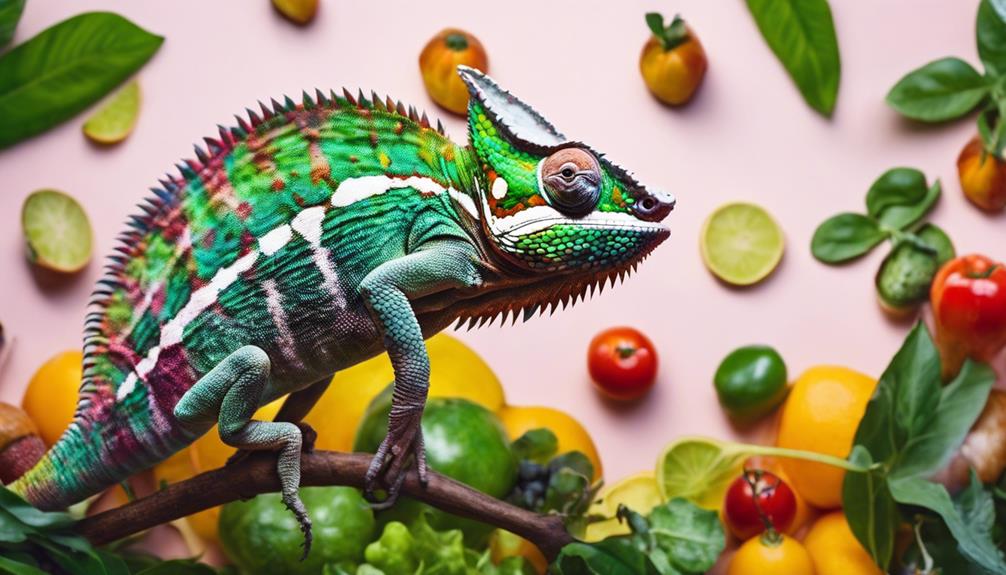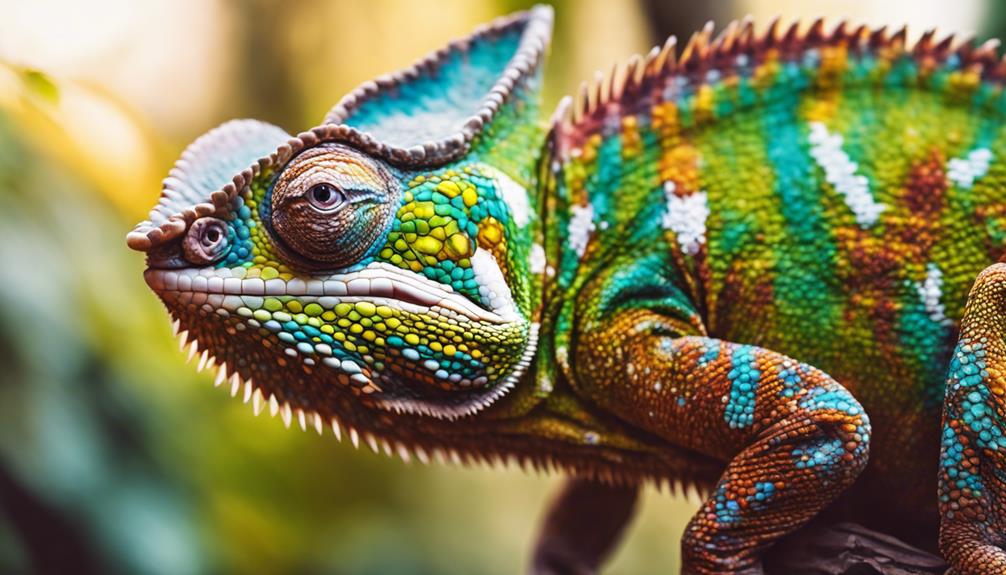Did you know that aglaonema is one of the most popular houseplants due to its vibrant foliage and low maintenance requirements?
However, when it comes to your chameleon's safety, there are important considerations to keep in mind. While aglaonema is generally considered safe for chameleons if not ingested, there are potential risks associated with this plant that you need to be aware of.
Understanding the implications of having aglaonema around your chameleon is essential for ensuring their well-being.
Aglaonema Plant Toxicity for Chameleons
Aglaonema plants, commonly found in households, pose a potential risk to chameleons due to the presence of irritating oxalates in their tissues. These oxalates are compounds that, if ingested, can cause discomfort and irritation to your chameleon. While the toxicity level of Aglaonema for chameleons isn't severe, it's essential to exercise caution. Monitoring your chameleon's interactions with Aglaonema is vital, especially if they tend to explore or nibble on plants out of curiosity.
It is important to understand that oxalates are common in many plants, like pothos and ficus, and evaluating the potential risks of Aglaonema for chameleons involves recognizing this fact. Even though some sources may indicate that Aglaonema is safe for chameleons, it's advisable to be vigilant due to the potentially irritating compounds present in the plant. By being aware of the risks and taking proactive measures to prevent ingestion, you can assure the well-being of your chameleon.
Potential Risks of Aglaonema for Chameleons
When considering the potential risks of plants like Aglaonema for your chameleon, understanding the presence of irritating oxalates becomes a critical factor in ensuring your pet's well-being. Chameleons may occasionally eat plants, including Aglaonema, out of curiosity, making it essential to be aware of the potential risks associated with this plant. Here are some key points to take into account:
- Toxicity Levels: While the toxicity level of Aglaonema isn't high, it contains potentially irritating oxalates in its tissues, similar to ficus and pothos. Ingesting these oxalates can lead to discomfort or irritation for your chameleon.
- Monitoring Interaction: Monitoring your chameleon's interactions with Aglaonema is crucial for their safety. Keep a close eye on your pet to make sure they aren't consuming large amounts of this plant, which could exacerbate any potential risks.
- Safe Plant Lists: Refer to safe plant lists recommended for chameleons to make sure you're providing a suitable environment for your pet. These lists can help you avoid potential risks associated with plants like Aglaonema.
Benefits of Aglaonema for Chameleons
Enhancing your chameleon's habitat with Aglaonema can provide a diverse range of benefits for their well-being and enrichment.
The lush foliage of Aglaonema not only adds visual interest to the enclosure but also offers essential hiding places for your chameleon, allowing them to feel secure and reduce stress.
These plants also create climbing opportunities, mimicking their natural habitat and encouraging physical activity.
One significant advantage of Aglaonema is that they're non-toxic to chameleons, ensuring the safety of your pet if they decide to explore or nibble on the plants.
Additionally, Aglaonema's low maintenance requirements make them an excellent choice for chameleon owners, adding a touch of nature without demanding extensive care.
Safe Practices With Aglaonema Around Chameleons
To guarantee the well-being of your chameleon, it's important to comprehend and implement safe practices when incorporating Aglaonema plants into their habitat. When it comes to the safety of your chameleon in relation to different types of plants like Aglaonema, here are some essential practices to ponder:
- Understand Toxicity Levels: Familiarize yourself with the toxicity levels of plants like Aglaonema, similar to ficus and pothos, to make informed decisions about what to include in your chameleon's cage.
- Consult With Experts: Seek guidance from experts in chameleon care and plant toxicity to make sure the plants in the chameleon cage are safe and suitable for your pet.
- Monitor Chameleon Behavior: Keep a close eye on your chameleon's interactions with plants like Aglaonema, especially if they tend to sample different vegetation, to prevent any potential harm.
Monitoring Chameleons Around Aglaonema
If you're considering introducing Aglaonema plants into your chameleon's habitat, closely monitoring their interactions with this greenery is paramount for their safety. Even though chameleons typically don't consume plants, occasional nibbling out of curiosity can't be ruled out. Since Aglaonema contains potentially irritating oxalates, being careful is vital.
Regularly observe your chameleon in its cage to make sure it's not showing excessive interest in the green leaves. If you notice any signs of nibbling or ingestion, consider replacing the Aglaonema with safe alternatives like plastic plants.
Understanding the toxicity level of Aglaonema can help you assess the risks associated with your chameleon being around these plants. Implement preventive measures by providing enough hydration and a balanced diet to deter your chameleon from exploring potentially harmful plants.
Frequently Asked Questions
What Plants Are Toxic to Chameleons?
When it comes to chameleons, being aware of poisonous plants is essential. Harmful foliage like dieffenbachia and schefflera, toxic greenery such as ivy, and dangerous flora like philodendron can pose risks. Monitor their environment closely.
What Plants Are Good for Chameleons?
You've hit the jackpot with chameleon-friendly plants! From the spider plant's air-purifying prowess to the vibrant hues of the Hibiscus plant, your chameleon will thrive among the Bromeliad species, Ficus tree, and more.
Are Aloe Plants Safe for Chameleons?
Aloe vera benefits chameleons, aiding in skin irritations. Aloe plants are safe, not toxic when ingested in small amounts, enhancing chameleon health. Make sure a varied diet for overall well-being and a suitable habitat for best chameleon behavior.
Are Golden Pothos Toxic to Chameleons?
Golden Pothos is non-toxic to chameleons, posing no harm or toxicity risks. Chameleons can safely enjoy this plant in their habitat, enhancing their environment. Assure a healthy diet and monitor chameleon health while incorporating Golden Pothos for enrichment.
Conclusion
To sum up, while Aglaonema plants may not be the safest choice for chameleons due to potential irritation from oxalates, they can still be enjoyed with caution.
Like walking a tightrope, balancing the benefits and risks of having Aglaonema around chameleons requires careful monitoring and safe practices.
Consider alternative plant options to guarantee your chameleon's well-being and happiness.


